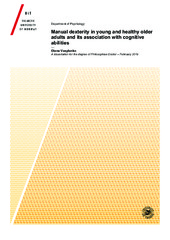| dc.contributor.advisor | Rodríguez-Aranda, Claudia | |
| dc.contributor.author | Vasylenko, Olena | |
| dc.date.accessioned | 2019-06-04T13:31:56Z | |
| dc.date.available | 2019-06-04T13:31:56Z | |
| dc.date.issued | 2019-05-21 | |
| dc.description.abstract | <p><i>Background and aims - </i>Much research has been conducted on age-related changes in cognitive function, but psychomotor abilities, such as manual dexterity, have been less studied. A better understanding is needed of which movement components account for the general slowing of performance and how central factors, such as cognitive decline, contribute to slowing. The aims of this thesis were to evaluate a) differences in manual dexterity of young and healthy older adults and b) the role of cognitive abilities in dexterity performance. Additionally, the contributions of gender and neuromuscular hand function were assessed.
<p><i>Methods - </i>A novel methodological approach combining the Purdue Pegboard Test and motion capture was employed. Movement times and kinematic parameters were obtained for four actions: reaching, grasping, transport, and inserting of pins. Cognitive abilities were assessed by a neuropsychological battery.
<p><i>Results - </i>Slowing of performance was found in both unimanual and bimanual tasks, but the amount of slowing differed by type of action. Whereas movement times of grasping and inserting were longer in older adults across all tasks and for both hands, reaching and transport were slower only when performed with the left hand. Kinematic differences were specific to movement type: for reaching and transport, the largest differences were in linear velocity; for grasping and inserting, in path length and angular velocity. Older males showed more slowing compared to females. Executive function was a significant predictor of dexterity in the older group, but not in the younger. Executive function was related to movement times during reaching and grasping, as well as to path lengths during grasping and inserting pins.
<p><i>Discussion - </i>These findings advance the current understanding of age-related dexterity decline and identify executive function as an important contributing factor. Results are relevant for dexterity assessment in research and clinical contexts. Future studies should investigate neural mechanisms of dexterity decline and its association with cognitive function. | en_US |
| dc.description.doctoraltype | ph.d. | en_US |
| dc.description.popularabstract | The topic of this thesis is how hand dexterity is affected by aging and cognitive decline. Proper hand dexterity is essential for our daily activities, but it usually declines with aging, restricting older adults’ ability to function independently. Therefore, it is important to determine the exact nature of decline and what factors contribute to it. We used a novel method that consists of video recording and detailed analysis of hand movements. Results showed most decline in complex movements involved in object manipulation but less decline in fast, reaching movements. Successful performance depended on cognitive function in older adults but not in young. This implies that object manipulation is relatively automatic in young age but requires more effortful processes in older age. Findings are relevant for assessment of hand dexterity in research and clinical contexts, and for interventions aimed at prevention of functional decline in the older population. | en_US |
| dc.description.sponsorship | Department of Psychology | en_US |
| dc.identifier.uri | https://hdl.handle.net/10037/15428 | |
| dc.language.iso | eng | en_US |
| dc.publisher | UiT The Arctic University of Norway | en_US |
| dc.publisher | UiT Norges arktiske universitet | en_US |
| dc.relation.haspart | <p>Paper I: Rodríguez-Aranda, C., Mittner, M. & Vasylenko, O. (2016). Association between executive functions, working memory, and manual dexterity in young and healthy older adults: An exploratory study. <i>Perceptual and Motor Skills, 122</i>(1), 165-192. Also available at <a href=https://doi.org/10.1177/0031512516628370>https://doi.org/10.1177/0031512516628370</a>.
<p>Paper II: Vasylenko, O., Gorecka, M.M. & Rodríguez-Aranda, C. (2018). Manual dexterity in young and healthy older adults. 1. Age- and gender-related differences in unimanual and bimanual performance. <i>Developmental Psychobiology, 60</i>(4), 407-427. Accepted manuscript version available in Munin at <a href=https://hdl.handle.net/10037/14537>https://hdl.handle.net/10037/14537</a>.
<p>Paper III: Vasylenko, O., Gorecka, M.M. & Rodríguez-Aranda, C. (2018). Manual dexterity in young and healthy older adults. 2. Association with cognitive abilities. <i>Developmental Psychobiology, 60</i>(4), 428-439. Accepted manuscript version available in Munin at <a href=https://hdl.handle.net/10037/15072>https://hdl.handle.net/10037/15072</a>. | en_US |
| dc.rights.accessRights | openAccess | en_US |
| dc.rights.holder | Copyright 2019 The Author(s) | |
| dc.rights.uri | https://creativecommons.org/licenses/by-nc-sa/3.0 | en_US |
| dc.rights | Attribution-NonCommercial-ShareAlike 3.0 Unported (CC BY-NC-SA 3.0) | en_US |
| dc.subject | VDP::Medical disciplines: 700::Health sciences: 800::Other health science disciplines: 829 | en_US |
| dc.subject | VDP::Medisinske Fag: 700::Helsefag: 800::Andre helsefag: 829 | en_US |
| dc.subject | aging | en_US |
| dc.subject | manual dexterity | en_US |
| dc.subject | kinematics | en_US |
| dc.subject | executive function | en_US |
| dc.title | Manual dexterity in young and healthy older adults and its association with cognitive abilities | en_US |
| dc.type | Doctoral thesis | en_US |
| dc.type | Doktorgradsavhandling | en_US |


 English
English norsk
norsk
